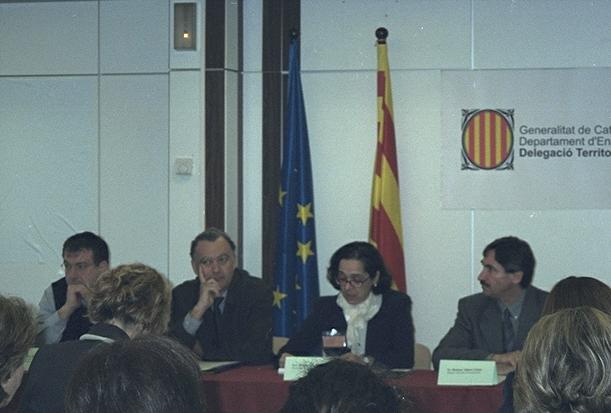Personal Identity and social living
Training course in Lleida
photo (Sessione inaugurale - laboratorio - visite)
Training course in Lleida
photo (Sessione inaugurale - laboratorio - visite)

Training course in Lleida, 10th
/ 14th April 2000 - Synthesis
of the EAP report
Segrià-Sector B - Equipe d’Assessorament i
Orientaciò Psicopedagogia, Lleida-Spain.
Introduction
When we defined our proposal for the training course, we have considered the following three fundamental objectives:
2. We would describe the educational policies developed by the Autonomous Government of Catalonia and from the Local Administration (Municipality of Lleida: IME, municipal institute for education). These policies have been carried out in different ways, using different methods and educative programmes. They are creating a net of services that gives an answer both to "formal" (education centres) and "informal" exigencies of learning spaces (Nursery services, social services of Atención Primaria, children’s recreation centres, and so on).
3. Our third aim was to share the training with a wide
group of professional competences, with different features deriving from
a different formative route, from different jobs and from the environment
in which they have developed their skills: psychologists, pedagogists,
social operators, educators, teachers of nursery, primary and secondary
schools, students, trainees.
- Diversity exists and the intercultural learning is a dynamic process starting from two fundamental ideas: on the one hand the personal behaviour of those people who have to ace this reality; on the other hand the time that is necessary to assimilate this deep change.
- We think that attitudes must be learned through the apprenticeship and not "with a pen and a piece of paper". Apprenticeship has to be an "Experience of life", a group of relationships that take place in a precise time, which is an emotional one. "Emotional time" does not correspond to the chronological one; it coincides with the internalisation of the experiences we experimented during the whole cycle of our lives.
- We cannot start only from the school in order to make an intercultural learning real. We must involve all the institutions that collaborate to the development of individuals, pointing out common aims. Further more we should realize a co-ordinating net that could facilitate the reciprocal "permeability".
- Our consulting function puts us in a specific context (inside and outside the institutions) relating with conflicts situations. One of our fundamental aims is to know different situations, trying to understand the different representations of the same reality that everyone has, so that we can find some possible alternatives and solutions together. In this way we can interpret the conflict not as something negative, but as an opportunity to know, to think, to interiorise, to build together with the others.
- On the basis of the reflections we have just made we think that the training of all the jobs concerning learning must be centred around the conflicts management, mediation and social competences and not only around curricular topics.
- We guess that some of the fundamental aspects of the
training directed to the jobs taking part to the project are the conflicts
management, mediation and social competences.